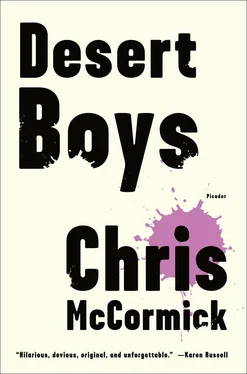“Ha,” I said — actually saying the word. I wondered (a) if he remembered me from high school (probably not) and (b) if I — far less stylish as an acne-scarred, uncombed, short-but-lanky white dude in a polo shirt — had made a good first impression. I resisted the urge to ask, and told him that once the recorder came on, the conversation would be about the ways he — and only he — was special. “Trust me,” I said. “My editor has no interest in getting to know me better.”
“You’ll seep through anyway,” Joshua said, not unkindly. His music was still on, and I could make out the snare hits through the headphones around his neck. “As soon as you choose what to say or write,” he said, “you start seeping through. And it only gets messier the more you say.”
THE ASSIGNMENT
My class — Antelope Valley High, 2005—was the first to graduate not as Rebels, but as Desert Tortoises. Joshua’s was the next. After earning his bachelor’s degree in Political Science and Philosophy at Stanford, he became, at the age of twenty-three, the seventh-youngest city council member in Oakland’s history. Now, at twenty-five, he was mulling his first mayoral run. It was too early in the campaign for him to be followed around by reporters, but his name had been floated as a possible candidate, and early polls were lending credence to some — if not all — of his confidence. My assignment was to:
1. Conduct, over lunch in San Francisco (where he’d scheduled a cross-Bay photo-op), an interview with Stilt.
2. Return to Stilt’s Oakland apartment for a prearranged photo-shoot with his friend, a photographer named Jenna King.
3. Attend, in the evening, a “green jobs” event at which Stilt was scheduled to speak.
4. Write the spotlight, tentatively titled, “The President of the Future Presidents Club.”
The publication for which I was writing — a Los Angeles — based, century-old magazine turned website — wasn’t the first to speculate on Joshua Stilt’s bright future in politics, but it was the first to acquire an exclusive feature with him (citing his L.A. County birthplace). Stilt and I had never been friends, but I’d been thinking a lot lately about what motivates a person from our hometown to leave, and whether there was some essential difference between people like us and those who chose to stay. In fact, that’s how I’d pitched the article in the first place — from the point of view of someone who went to high school with Joshua Stilt — but my editor advised me to keep the focus on the subject at hand. “Do whatever you need to do,” she added at the end of our conversation, “as long as you don’t turn this into a story about you.”
And so I’d kept certain facts of my life — some more important than others — from Joshua Stilt. I hadn’t told him, for instance, that for the previous two weeks I’d had a dull but constant headache, the result of getting so little sleep. I’d been living with my partner, Lloyd, for nearly a year in San Francisco, but a recent series of disagreements (he wanted to meet my mother) had me sleeping on the stiff corduroy couch of a friend on the south side of Berkeley.
I’d stayed up the night before searching the internet for old interview clips with Joshua Stilt regarding the Hitler-mustache controversy. Some of the footage showed panning shots of the high school during lunch, and when I started looking for myself among the crowd — going so far as to pause the video — I knew it was time to shut off the laptop and try, again, to sleep.
THE TRANSCRIPT, 1/3
JS:You can probably tell your readers more about the Antelope Valley than I can, Daley. I’d rather talk about Oakland.
DK:We’ll get there, but I’d like your thoughts on growing up in the AV. Like, how did growing up there affect your worldview, et cetera.
JS:On the record or off? [ Laughter .]
DK:Whichever, just let me know which is which.
JS:Okay. On the record: The AV’s an interesting place. Edge of the Mojave Desert, so, hot and isolated. Not a lot to do. I ended up spending a lot of time in my own head. I thought the Joshua trees were named after me, for example, and then I thought I was named after them. [ Sounds from the espresso machine. ] I couldn’t face the fact that we had absolutely nothing to do with one another, other than accidentally being in the same place. Mostly I thought about leaving, and what I was going to do after I left. I wanted to live in a place where I wasn’t the only one trying to change things, you know? When you’re basically the only one of your kind in a town, whether it’s an activist, or if it’s the only black kid in class, or the only gay kid, or both, like—
DK:James Baldwin?
JS:I was going to say Frank Ocean — [ laughter ] — but sure. There are specific challenges for each minority — black and gay aren’t the same, obviously — but the common link if you’re the only one of your kind is that it’s tough to get taken seriously by the majority. People hear you complain and say, “If you don’t like it here, then leave.” If you don’t complain, you start feeling complicit. I just had to learn to ignore everyone, even myself, wait it out, and save my energy for a more worthwhile [ inaudible ]. Turned out to be a good place for me to grow up, actually, because good politicians aren’t only adept at being frustrated, but also at knowing what to do with that frustration.
DK:I’m afraid to ask about your off-the-record response.
JS:Off the record? It’s where I’m from, but it’s not what I’m about. I’ve been able to move, the fuck, on. [ Laughter. ]
THE PLAZA
Some notes on the city at Sixteenth and Mission: In the corner are the steps leading down to the BART platforms, to the trains, all trains this way, this way all trains. Between you and those steps lives a micro-city; women selling homemade tamales; women nursing babies; pigeons loitering near the bus stops. There are the homeless and cheery — the jokesters, the peddlers, the I NEED MONEY FOR WEED sign-holding, missing-tooth-grinning, dog-owning variety; and there are the homeless and despondent — asleep, you hope, bundled up on the concrete in eighty-four-degree, windblown weather, nearly indistinguishable from the trash bags tethered to their ankles with yellow, flapping drawstrings. Their pockets are full of fifteen-cent, shoeprint-stomped BART cards they’ve peeled from the ground in their travels through the macro-city, travels that must occur in the night, though you can’t imagine them getting up off the checkered floor. Note the checkered floor. Black-and-white diamonds on the plaza, and you think: Makes sense. Chess is a game, checkers is a game, but chess and checkers have nothing on this. This — surviving a place — is the game. The hiss-stop, gunshot blare of a bus shakes everyone but the permanent inhabitants of the micro-city, and a heat wave from the bus’s exhaust turns the whole scene into a watery mirage you can’t wait to get close enough to dispel. You arrive at the steps and turn the corner, careful not to touch the handrail, and a black man in a battered three-piece suit is selling flowers on the stairwell. Just in the seven seconds it takes to cross the plaza to the steps, you’ve grown so used to ignoring these people that you’ve already made it to the bottom of the steps before realizing the person you’ve been walking with is still at the top, backlit by the day above him, fishing through his navy blue suede jacket for cash as the man in the suit bundles together the stems of four or five flowers with twine. The stench of urine — faintly at the back of your throat since arriving in the Mission — is faint no more. The stairwell, ground zero for the smell, is no place to linger. Your train is coming — you can hear it and feel the molecules in the air come to life, a savior — and you call out to the person at the top of the stairs: Our train is coming. The two of you jump on just before the sliding doors close, and take the two green, carpeted seats beneath the royal blue RESERVED FOR PERSONS WITH DISABILITIES sticker. No one will call you out on sitting here, but a small-town kid like you cares about rules. You practice your response just in case: As soon as someone needs this seat, I’ll be happy to move. In your mind, the response comes off as less forthcoming and more self-righteous, so you practice until you achieve the desired tone. Beside you, the subject of your assignment — the future president — cradles a newspaper-wrapped cluster of yellow-and-orange violets and acacias, water seeping through last week’s top stories. You live in this world, it occurs to you. You’ve lived in the Bay Area for years, but you never felt comfortable calling it home. For the moment, you’ve been considering yourself a visitor on assignment, and you’ve enjoyed the label, the justification for being here, but there is no such thing as a visitor, and you know it. Maybe there is only one city, micro or macro, and you happen to be a citizen. A woman approaches. Your heart jumps.
Читать дальше












